Can Birds Pick Up Their Babies? What You Need to Know!
Last Updated on
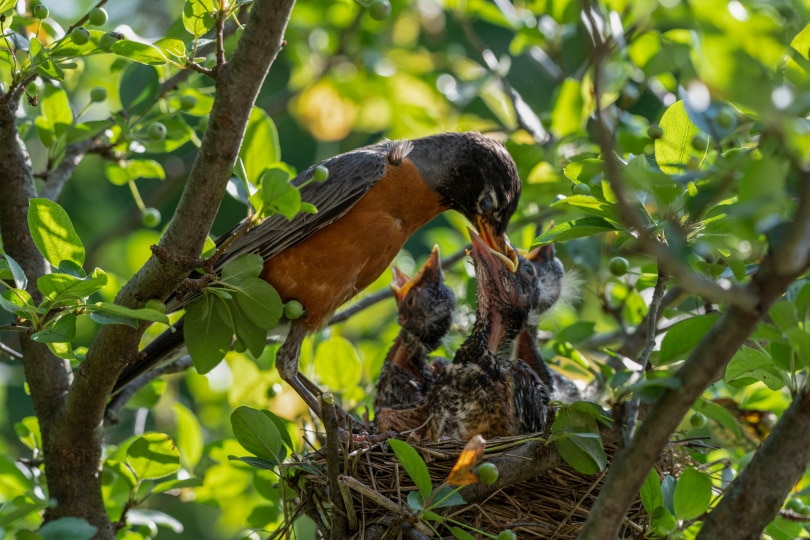
You might have found yourself wondering if birds can pick up their young. It’s one of those familiar images you’ll often encounter on nature networks, magazines, and blogs—the mother carrying their newborns. It’s a fair question, but the answer is usually no.
In fact, the exception to the rule is often quite disturbing to think about—as are many aspects of nature. While most birds are simply not strong enough to pick up their young, the ones who do are often not doing so with the chick’s best interests at heart.
Brace yourself because this is a dark side of mother nature: While most birds won’t pick their young up if they fall from the nest, they will sometimes throw the weakest or youngest out of the nest. Mother birds will also do this when chicks die naturally, and, though they likely don’t know this, it is necessary for keeping disease out of the nest.
It’s a sad fact of nature, but only about 56% of chicks survive the nest1. It’s a hard world while living in the wild, and only the strong survive.
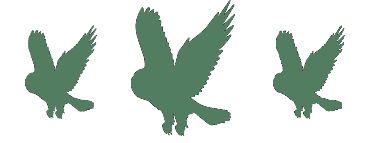
What Happens if a Chick Falls From the Nest?
Again, the laws of evolution and strength prevail here. If a bird’s baby falls from the nest and survives, it is now, unfortunately, on its own. While some birds will simply view this as weakness, those who would rescue their young are simply incapable of doing so. Birds of prey strong enough to pull them back up simply won’t do so. However, there is still hope for a fledgling.
If they can make small flights and successfully climb from branch to branch, it is possible for them to rejoin their siblings. As a good Samaritan and a lover of all living things, you probably wonder about the same thing we do—is it okay to put a fallen chick back into its nest?
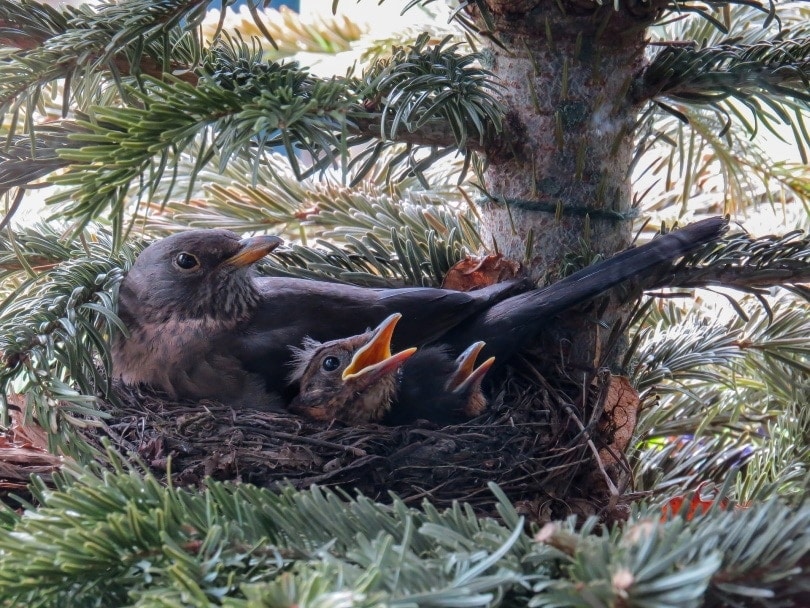
Is It Okay to Help a Chick Back Into Their Nest?
The answer is that it depends. Usually, it’s best to let mother nature run its course. With that said, there are a couple of protocols to follow. We recommend calling your local animal control and not touching any wildlife even if you can help it. It’s important to understand that not all young birds have the same needs.
If a chickling or hatchling has survived the fall from their nest, and you can reach the nest, then some sources say that it’s okay to attempt to put them back. Be careful to make sure that the parents aren’t home, or they will attempt to defend their nest, which might not go well.
The other side of the parents being home is that they may be responsible for the young or baby bird being out of the nest in the first place, and trying to put them back will do no good. This may be a salvaging situation for the bird if they are hatchlings or nestlings, but in the case of the older fledglings, it may not be a sad situation at all.
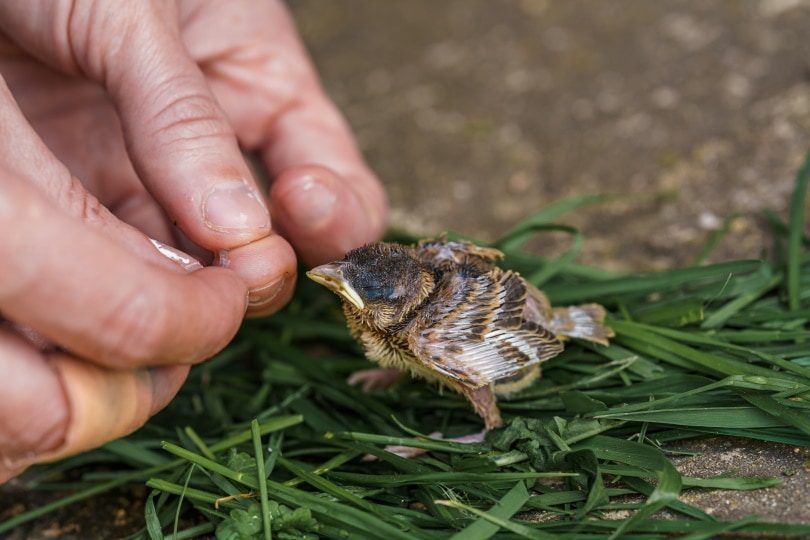
Hatchlings, Nestlings, and Fledglings
Fledglings are the teenagers of the bird world. It is natural and good for them to begin getting out of the nest at this age and growing into their environment. If you find a fledgling out of the nest, leave them alone. It’s not always bad for young birds of that age to be out of the nest. So, how do you tell if the bird is a hatchling, nestling, or fledgling?
Fledglings start to look cute while the rest still haven’t come into their attractive features yet. So, if the bird looks like a smaller, younger version of an adult, leave them alone. If they are still missing feathers and look like babies, put them back. Now, you might be shaking your head and thinking that putting a hatchling back in the nest is futile because of the common myth that a mother will reject her young if they are touched. Is that really true?
Will the Mother Bird Reject Her Young If They Are Touched?
Nope! This is just an old myth that has no truthful elements behind it. With that said, you shouldn’t just go pick up every baby bird that you see. Often, the parents are nearby, and the nest might not be as high up as you might assume.
The problem with human meddling isn’t from the smell—-birds don’t have that strong of a sense of smell, but you are likely to attract the attention of predators that will come along and eat them. So, only pick up the young birds if you can see the nest and be careful when putting them back.
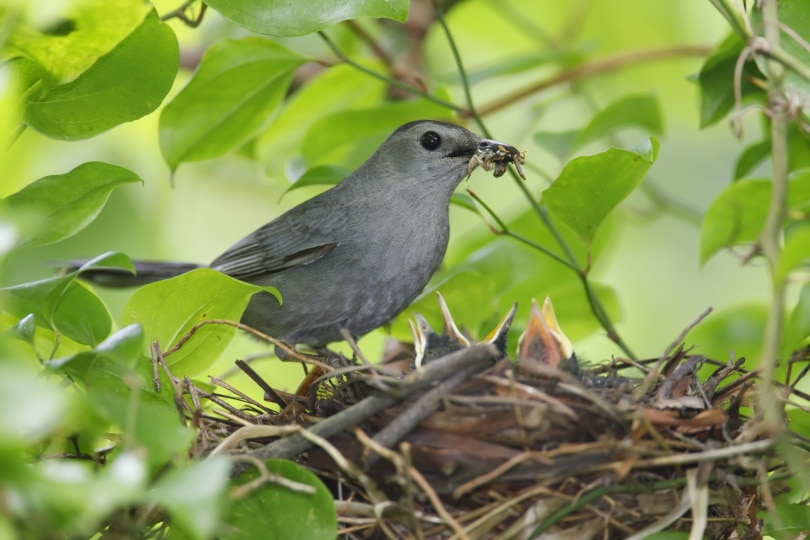
Can You Get Sick From Touching a Baby Bird?
This is far from a myth! Birds carry bacteria that cause diseases in humans, so if you find yourself in a situation where you need to handle a baby bird, be sure to wear gloves. An N95 mask and eye protection also aren’t a bad idea. No matter what you do, handle them very carefully and wash up after. We don’t need another 2020 on our hands!
Related Read: Do Baby Birds Drink Water? What You Need To Know!

Summary
Man’s role in mother nature has always been at odds with our best intentions. With that said, we are fortunate to have scientists to help better understand the nuances of when and when not to help a mother bird pick up its baby.
Featured Image Credit: Randall Vermillion, Shutterstock
About the Author Robert Sparks
Robert’s obsession with all things optical started early in life, when his optician father would bring home prototypes for Robert to play with. Nowadays, Robert is dedicated to helping others find the right optics for their needs. His hobbies include astronomy, astrophysics, and model building. Originally from Newark, NJ, he resides in Santa Fe, New Mexico, where the nighttime skies are filled with glittering stars.
Related Articles:
Can You Use Binoculars to Look At Stars? How to Choose the Right Pair
10 Types of Hummingbirds in Arkansas (With Pictures)
8 Types of Hummingbirds in Nebraska (With Pictures)
5 Types of Hummingbirds in Idaho (With Pictures)
3 Types of Hummingbirds in Mississippi (With Pictures)
8 Types of Hummingbirds in Kansas (With Pictures)
5 Types of Hummingbirds in West Virginia (With Pictures)
5 Types of Hummingbirds in Ohio (With Pictures)
